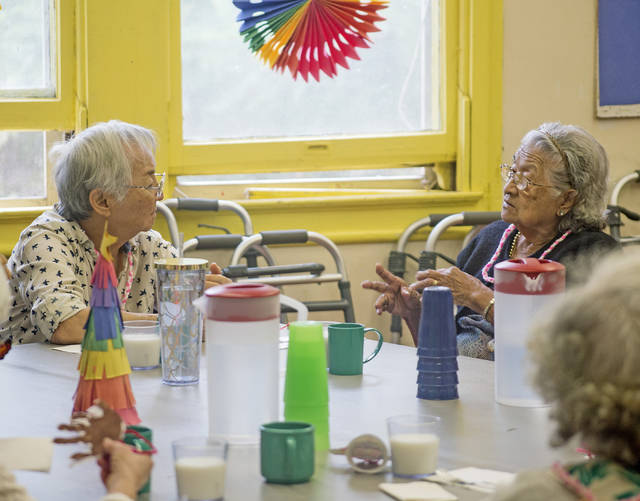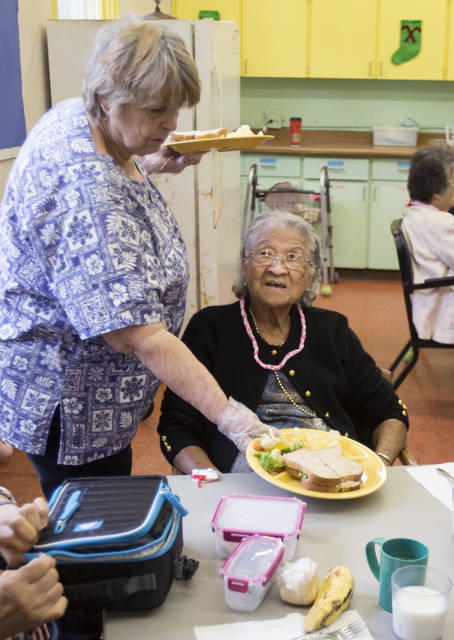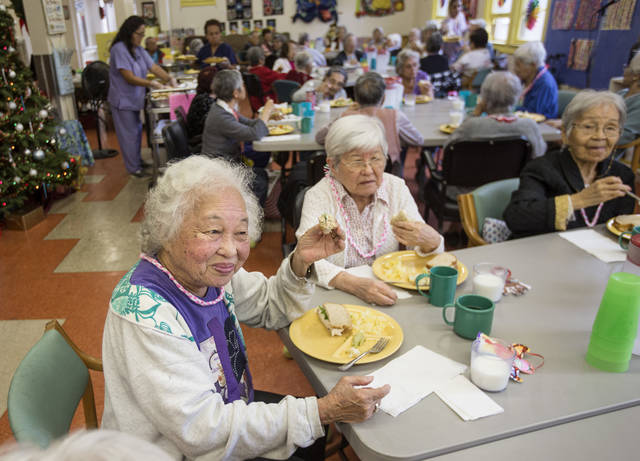New state initiative offers support for those working and taking care of kupuna

HOLLYN JOHNSON/Tribune-Herald
Florence Ebesuzaki and Carlina Ragual talk story before lunch Wednesday at Hilo Adult Day Center.


HOLLYN JOHNSON/Tribune-Herald
Betty Ung enjoys a sandwich during lunch Wednesday at Hilo Adult Day Center.
Hawaii is launching a pilot program to help working caregivers afford services for aging loved ones.
Hawaii is launching a pilot program to help working caregivers afford services for aging loved ones.
The Kupuna Caregivers Program will provide financial help of up to $70 per day for services such as home-delivered meals, personal care, respite, adult day care, transportation or homemaker assistance.
ADVERTISING
“The landmark initiative is a first step in recognizing the significant contributions and sacrifices of Hawaii’s working caregivers as they celebrate and honor their kupuna,” Gov. David Ige said in a statement announcing the program Wednesday. “Support for our caregivers is critically needed as Hawaii’s population is aging more rapidly than the national average and our seniors live longer than seniors in any other state.”
Caregivers won’t get the money themselves. Instead, the money will go directly to the service provider. Funds can be used only for services not covered by other agencies or comparable programs.
The Hawaii Executive Office on Aging, which will manage the program, said there are an estimated 154,000 unpaid family caregivers in Hawaii.
Act 102, which established the caregiver program and was signed into law by Ige earlier this year, says the average Hawaii caregiver is “a 62-year-old married woman who cares for an elderly parent or husband while still working.”
To qualify for the program, which cannot be used for nursing home residents, those helped by family caregivers must be 60 or older, U.S. citizens or qualified aliens, not living in a long-term care facility and have at least two impairments in their ability to undertake activities of daily living or need help from equipment to navigate life tasks.
For many family caregivers, said Marcie Saquing, executive director of Hawaii Island Adult Care in Hilo, the money will be “taking the edge off, financially, from caregiving.”
Hawaii County Executive on Aging C. Kimo Alameda said the county already provides caregivers with services for kupuna, but with fewer restrictions than the new state program.
The state program requires participants to be employed at least 30 hours per week in addition to their responsibilities as a caregiver at home. The intent, Alameda said, is to help keep working caregivers employed. The county does not have that requirement.
He said the state Legislature, when it passed the legislation creating the program, probably intended to offer caregivers respite. But “it’s actually not caregiving respite — because this is to help them keep the jobs. That’s not respite,” he said.
Once a caregiver comes home from work, he said, the person continues working as a full-time family caregiver — and there’s no rest.
The county requires a care recipient to show need, such as walking limitations, memory trouble, poor strength or an inability to read a pill bottle’s contents, in order to receive financial help.
He said the county is able to offer the aid because of the “business acumen” of county staff and keeping tight control of expenditures.
“We leverage our partnerships. We use volunteers. The county shoulders the cost of most of our staff,” Alameda said.
He’s hopeful the Legislature will ask for input from the county during the upcoming session and remove the work requirement for the state program — and the $70 per day limit on financial assistance.
In Hawaii County, actual respite — when professionals help caregivers take time away for errands, a haircut, a movie or rest — costs about $25-$28 per hour, Alameda said. The state’s $70 daily limit, “that’s about, like, two hours of respite time for the caregiver,” he said.
The state pilot program is set to end June 30, 2018. Total funds of $600,000 are available for the Kupuna Caregivers Program until then.
But Saquing said the Legislature will be asked by advocates for the elderly to continue the program.
To apply for the state program, call the state Aging and Disability Resource Center at 643-2372.
To seek county assistance, contact Alameda’s department at 961-8626.
Email Jeff Hansel at jhansel@hawaiitribune-herald.com.


